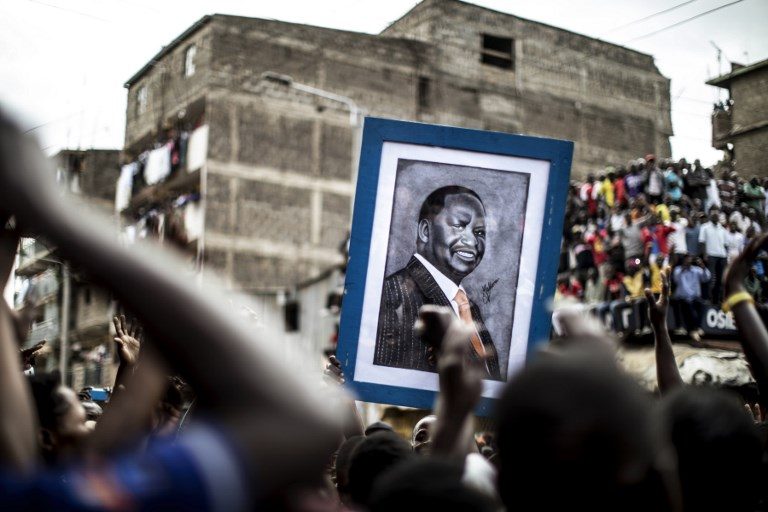SUMMARY
This is AI generated summarization, which may have errors. For context, always refer to the full article.

NAIROBI, Kenya – Kenya’s opposition leader Raila Odinga has urged his supporters to stay home from work Monday, August 14, to mourn those killed in protests over what he claims was a rigged election, while he mulls his next move.
Government officials have urged citizens to return to work, after days of anxiety since last Tuesday’s (August 8) election left Nairobi – a bustling city of more than 3 million people – near-deserted.
On Sunday, August 13, life appeared to slowly be returning to normal with businesses opening and deadly protests that erupted Friday night, August 11, after the election result fizzling out as Odinga’s supporters await his next move.
At least 16 people have died in protests in Odinga’s strongholds, according to an Agence France-Presse tally, many shot dead by police.
“We are not done yet. We will not give up. Wait for the next course of action which I will announce the day after tomorrow (Tuesday),” Odinga told a crowd of thousands in Nairobi’s slum Kibera on Sunday.
“Do not go to work tomorrow. Let us mourn the innocent people killed by police.”
It was his first appearance since the election commission (IEBC) on Friday declared President Uhuru Kenyatta the victor of a vote that Odinga says was rigged.
The 72-year-old and his National Super Alliance (NASA) coalition believe he was the rightful winner, and that results which came in via an electronic tallying system were hacked and manipulated.
Foreign observers praised election day as peaceful and credible and expressed confidence in the IEBC, but have not commented on the counting process.
The United Nations, Britain and the European Union have beseeched Odinga to send out a message to restrain his supporters from protesting, and instead use legal means to address his concerns.
In asking his supporters to stay home, he also urged them to avoid police, but many are hanging on for instructions come Tuesday.
“It was quiet and we were worried, because we did not know the plan. Now, we’re very ready for whatever will come,” said Duncan Nyamo, an Odinga supporter in Kibera
“We are ready to die.”
‘Zero-sum game’
Politics in Kenya is largely divided along tribal lines, and the winner-takes-all nature of elections has long stoked communal divisions.
Three of Kenya’s 4 presidents have been Kikuyu and the other Kalenjin, leaving Luos and other major ethnic groups feeling excluded from power and marginalized for over half a century.
In 2007, Odinga and his allies claimed an election was stolen by Mwai Kibaki – a Kikuyu. Foreign observers agreed there had been irregularities.
Political grievances – over land and access to power linked to old ethnic fault lines – burst into the open, leading to two months of violence which left 1,100 people dead and 600,000 displaced.
“The reason elections have become a trigger for violence is the relationship between power and prosperity. It is a zero-sum game and winning becomes a life and death matter, hence losing is not an option,” the Daily Nation wrote in an editorial.
Odinga, who scored nearly 45% of the vote, has a huge following notably among the poor who are drawn to his platform of more equitable economic growth.
While calm had largely returned to Odinga’s strongholds on Sunday, a clash broke out in Mathare, one of the poorest slums in the capital, between his Luo supporters and members of Kenyatta’s Kikuyu group.
An attack on a Luo man – who an Agence France-Presse photographer saw with bloody head injuries – prompted a backlash in which Kikuyu businesses were burned and a Kikuyu man beaten with sticks and rocks. It was unclear if either survived.
The election was Odinga’s fourth failed shot at the presidency, and many believe his final.
He lost a court dispute in 2013 when he alleged an election was rigged, and this time NASA has said court is not an option. – Rappler.com
Add a comment
How does this make you feel?
There are no comments yet. Add your comment to start the conversation.